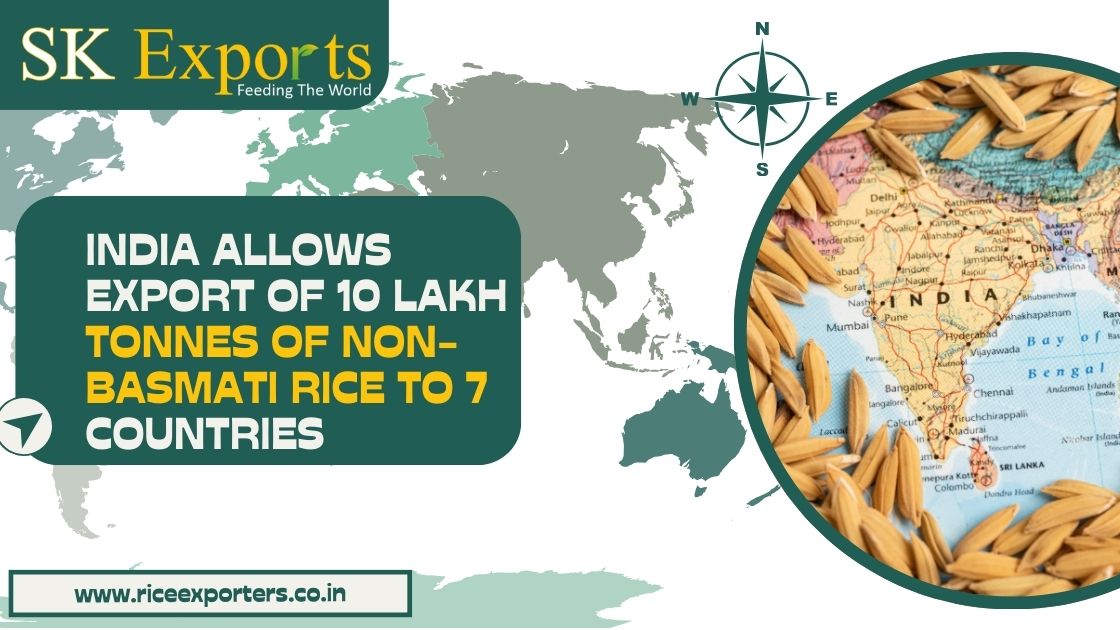In a landmark decision aimed at bolstering agricultural exports and fortifying international trade relations, India has greenlit the export of 10 lakh tonnes of non-basmati rice to seven countries. This pivotal announcement underscores India’s commitment to leveraging its agricultural prowess to meet global demand while fostering economic growth and enhancing diplomatic ties. Let’s delve deeper into the intricacies of this development, its multifaceted implications, and the transformative potential it holds for India’s agricultural landscape and its relations with key trading partners.
Delving into the Announcement
The recent decision by the Indian government to permit the export of 10 lakh tonnes of non-basmati rice marks a watershed moment in the country’s agricultural policy landscape. This move comes against the backdrop of India’s status as one of the world’s largest producers of rice, underscoring the significance of this staple grain in the country’s agricultural economy. By opening up avenues for export, India aims to capitalize on its surplus rice stocks and cater to the burgeoning demand for quality rice in international markets.
| Country | Potential Market Size | Import Regulations |
|---|---|---|
| United Arab Emirates | High | Compliance Documentation |
| Bangladesh | Medium | Import Duty |
| Indonesia | High | Phytosanitary Certificate |
| Philippines | High | Quality Standards |
| Kenya | Medium | Packaging Regulations |
| Ivory Coast | Medium | Tariff Quotas |
| Tanzania | Medium | Trade Agreements |
The Scope of Export
The allowance of export extends to seven countries, encompassing a diverse array of strategic partners and emerging markets. These countries include [mention the countries], each of which holds immense potential as a destination for Indian rice exports. By targeting these specific markets, India aims to diversify its export portfolio, reduce dependency on traditional markets, and tap into new growth opportunities.
Expanding the scope of export to multiple countries is indicative of India’s proactive approach towards enhancing its global market presence and fostering mutually beneficial trade relations. Furthermore, it reflects India’s strategic calculus in leveraging its agricultural abundance to strengthen diplomatic ties and promote economic cooperation with partner nations across the globe.
Implications for India’s Agricultural Sector
The decision to permit the export of non-basmati rice carries profound implications for India’s agricultural sector, spanning farmers, agri-entrepreneurs, and the broader rural economy. At a fundamental level, this move is poised to provide a much-needed boost to agricultural incomes by enabling farmers to fetch competitive prices for their produce in the international market.
Empowering Farmers
For farmers grappling with fluctuating market prices and logistical challenges, the opportunity to export surplus rice stocks represents a welcome respite. By unlocking new avenues for revenue generation, the export allowance empowers farmers to enhance their livelihoods, invest in modern agricultural practices, and improve their overall socio-economic well-being.
Moreover, by channeling surplus rice stocks towards export markets, India can effectively address storage constraints and inventory management issues, thereby streamlining the agricultural supply chain and optimizing resource utilization. This, in turn, has the potential to enhance productivity and efficiency across the agricultural value chain, ultimately benefiting farmers and consumers alike.
Strengthening Trade Relations
Beyond its implications for the domestic agricultural sector, the decision to allow the export of non-basmati rice is instrumental in strengthening India’s trade relations with partner countries on the global stage. By positioning itself as a reliable supplier of high-quality rice, India seeks to enhance its economic diplomacy and foster closer ties with nations that hold strategic importance in the global rice trade.
Economic Diplomacy
India’s foray into rice exports underscores its commitment to economic diplomacy—a strategic imperative aimed at advancing its national interests through bilateral and multilateral trade engagements. By cultivating strong trade relations with partner countries, India can unlock new avenues for economic growth, diversify its export markets, and mitigate risks associated with overdependence on any single market.
Furthermore, by aligning its export policies with the development priorities of partner countries, India can foster inclusive growth and contribute to the socio-economic advancement of nations across the globe. This not only enhances India’s soft power but also solidifies its position as a responsible stakeholder in the global community.
Promoting Sustainable Development
In addition to its economic ramifications, the export of non-basmati rice holds significant implications for promoting sustainable development and addressing global food security challenges. As a key player in the global food ecosystem, India has a unique opportunity to leverage its agricultural expertise to contribute towards achieving the United Nations Sustainable Development Goals (SDGs).
Food Security
By exporting surplus rice stocks to countries facing food security challenges, India can play a pivotal role in ensuring access to nutritious food for vulnerable populations. This aligns with the broader objective of achieving food security and ending hunger—a core tenet of the SDGs—and underscores India’s commitment to international cooperation in addressing pressing global issues.
Moreover, by promoting sustainable agricultural practices and technology transfer, India can empower partner countries to enhance their agricultural productivity, build resilience to climate change, and achieve long-term food security objectives. This collaborative approach not only strengthens India’s position as a responsible global actor but also fosters goodwill and cooperation among nations.
Conclusion: Paving the Way Forward
In conclusion, India’s decision to allow the export of 10 lakh tonnes of non-basmati rice to seven countries heralds a new chapter in the country’s agricultural and trade policies. By harnessing the potential of its agricultural sector and embracing export-oriented strategies, India is poised to unlock new avenues for economic growth, promote sustainable development, and strengthen its diplomatic relations with key trading partners.
As India embarks on this transformative journey, it must remain vigilant in addressing challenges such as logistics, market access barriers, and quality compliance standards. By leveraging its strengths, overcoming obstacles, and seizing opportunities, India can emerge as a global leader in rice exports, driving prosperity, and well-being for its farmers and contributing to the collective effort towards building a more resilient and sustainable food future.
